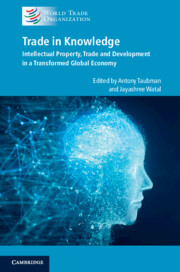Book contents
- Frontmatter
- Contents
- Figures
- Tables
- Contributors
- Preface
- 1 Thematic Overview: Charting the Evolution of Knowledge Flows
- Part I Conceptual Framework
- Part II Measuring Trade in Knowledge
- Part III Impact of Knowledge Flows on Trade and Development
- Part IV Policy, Regulatory and Legislative Frameworks
- Part V Looking Forward
- Index
12 - The Innovation Environment and Knowledge Diffusion: Improving Policy Decisions through Patent Analytics
from Part II - Measuring Trade in Knowledge
Published online by Cambridge University Press: 17 February 2022
- Frontmatter
- Contents
- Figures
- Tables
- Contributors
- Preface
- 1 Thematic Overview: Charting the Evolution of Knowledge Flows
- Part I Conceptual Framework
- Part II Measuring Trade in Knowledge
- Part III Impact of Knowledge Flows on Trade and Development
- Part IV Policy, Regulatory and Legislative Frameworks
- Part V Looking Forward
- Index
Summary
The introduction of intellectual property standards under the 1995 WTO TRIPS Agreement aimed to facilitate secure cross-border knowledge transfer. Standardized international patent data available to policymakers and managers can trace specific knowledge flows, for example those that occur frequently via mergers and acquisitions. Mergers shape current as well as future knowledge flows, for example by inter alia affecting the incentives and capabilities to innovate. Regulatory authorities in Europe have begun to examine these merger-related impacts on future knowledge flows to prevent potentially negative effects on consumers. One of the key challenges is how to measure these knowledge flows more accurately to make better decisions on important mergers. This chapter reviews an actual application of such a merger-related analysis of future knowledge flows: the European Commission’s approval decision of the Dow/DuPont merger. It shows how to measure relevant knowledge flows by means of novel patent analytics, moving beyond conventional patent indicators. In addition, it presents patent analytics using these novel patent measures to depict other potential analyses tracing and assessing knowledge flows in different contexts. It also shows where new knowledge has originated and how it has spread to other geographical regions. Countries are clearly interdependent when it comes to knowledge flows. It demonstrates how policymakers and managers can use future-oriented, quantitative patent analytics to improve policy decisions related to cross-border knowledge flows and innovation.
- Type
- Chapter
- Information
- Trade in KnowledgeIntellectual Property, Trade and Development in a Transformed Global Economy, pp. 376 - 402Publisher: Cambridge University PressPrint publication year: 2022
- 2
- Cited by

